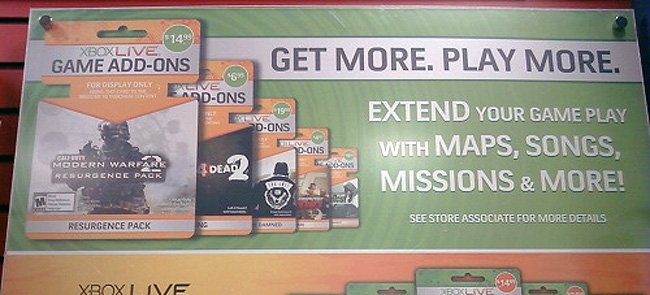DLC is content that is often designed, in part, to help monetize a used game market that doesn’t directly give publishers and developers any money. The irony is that GameStop has managed to monetize this burgeoning market quite successfully.
“DLC as a business was created largely not to include a retail partner,” said Brad Schliesser, GameStop’s director of retail digital distribution. “Since we’ve been in the business, [we’ve found that] nearly 50 percent of customers who are purchasing digital content have never bought it anywhere before. They never bought it directly from Microsoft, Sony, or Nintendo. They never bought a gift card to redeem on those platforms. There’s a whole other market of people who we’re able to sell this content to.”
A key part of GameStop’s success in selling DLC codes is the ability for them to use PowerUp Reward points and cash to purchase DLC. Roughly 70 percent of GameStop’s digital sales come from non-credit card transactions.

“When we first started [selling downloadable content] in 2010, we had less than a 2 percent attach rate for DLC to a physical game,” said Schliesser.”That started changing in holiday 2011, and what changed is publishers decided to start marketing digital content to customers when the game released rather than waiting three, six, or 12 months afterward.
“We kind of knew at that point that this is the right formula: You have to have a really good game, a game that has a history of good content, and you have to market it at launch. It also helps to have a sales person because that’s one thing that a digital platform [like the Xbox Live Marketplace or the PlayStation Store] really can’t do. You can’t have a customized interaction with someone who knows you and what your gaming habits are.”
The most popular piece of DLC was the “From Dust” pack for Mass Effect 3, which had a 50 percent attach rate at GameStop. The day one DLC, while controversial, was also considered somewhat vital to the experience and such is why many of the knowledgeable employees at GameStop were able to sell “From Dust” to customers so effectively.
“The most important thing that we found is the associates in the store drive the business. They understand what content is,” said Schliesser. “It’s easy for them to sell content to a customer when that customer is buying a copy of the game. DLC for us attaches better to a physical game than any other accessory or add-on that we have in our company — whether it’s a headset, a controller, or strategy guide — because it’s so easy for the consumer to understand what it is they’re getting. From very early on, we understood that we had to do a good job of not only educating the consumer but also educating the person behind the counter.”
Source: VentureBeat.com

